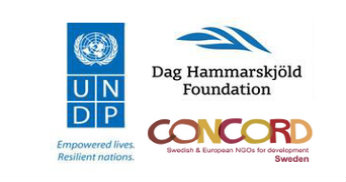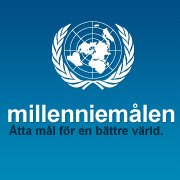
18 oktober, 2013
Se film från senaste post-2015 seminariet
Vem ska betala för hållbar utveckling? Ni som missade post-2015 seminariet ”Will the world pay for its vision? How to finance sustainable human development” den 8 oktober, kan nu se det här.
Diskussionerna kring de nya utvecklingsmålen är i full gång. Samtidigt är bristen på finansiering ett stort hinder i kampen mot den globala fattigdomen. Så vem ska betala för hållbar utveckling?
UNDP, Dag Hammarskjöldfonden och CONCORD Sverige bjöd in till seminariet ”Will the world pay for its vision? How to finance sustainable human development” den 8 oktober.
Här kan du som missade seminariet se det:
Inledning:
Jesse Griffiths:
Petra Lantz:
Taku Fundira:
Diskussion:
Seminariet är det sjunde i en serie om post-2015 agendan som arrangeras gemensamt av UNDP:s nordiska kontor och Dag Hammarskjöld Foundation.
Om deltagarna:
Jesse Griffiths, Director of Eurodad, the European Network on Debt and Development. He is also a member of CONCORD Europe’s Aidwatch Network. Jesse was previously the Coordinator of the Bretton Woods Project since 2008. Prior to that he headed Action Aid UK’s aid and development finance policy group, worked for the UK Department For International Development (DFID) in Nigeria, as well as for other NGOs in the UK and elsewhere on both development finance and international environmental policy.
Petra Lantz, Director of the UNDP Representation Office in Geneva, she has also served as UN Resident Coordinator and Representative for UNDP, UNFPA and UNICEF in the Cape Verde Joint Office. Petra Lantz has also worked for UNDP and UNFPA in Mozambique (2003-2008) and Estonia (1997-2001). Before joining UNDP, Petra was a researcher on labor market and gender issues, working for private industry, academia and the Swedish government. She holds a MBA from the Stockholm School of Economics.
Taku Fundira is a South African analyst with special interests in quantitative economic research. His work for SPII (Studies in Poverty and Inequality Institute) includes developing a regional economic model for a basic income grant. Prior to working at SPII, he worked for the Trade Law Centre (tralac). He holds a MSc. Degree in Agricultural Economics and is a member of the Agricultural Economics Association of South Africa (AEASA). He is also a founding member of the African Food and Agricultural Policy Platform (AFAPP) and a member of the National Agricultural Marketing Council (NAMC) Trade Reference Group.


